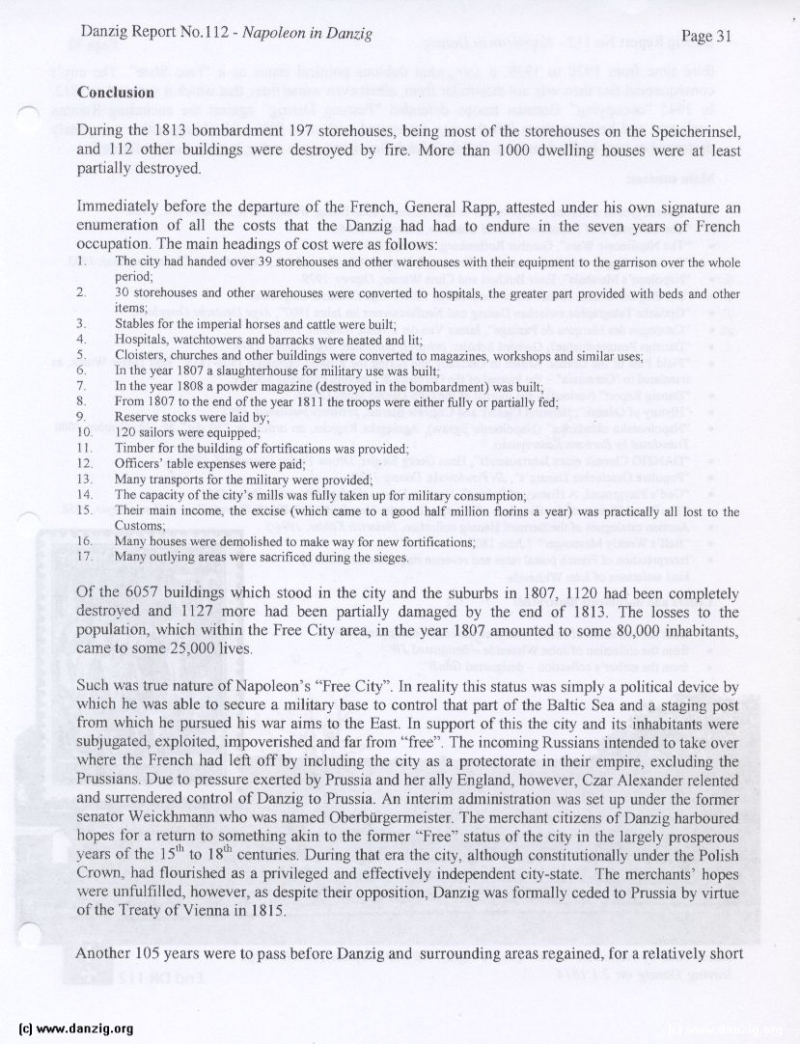
Conclusion
During the 1813 bombardment 197 storehouses, being most of the storehouses on the Speicherinsel. and 112 other buildings were destroyed by fire, More than 1000 dwelling houses were at least partially destroyed.
Immediately before the departure of the French, General Rapp, attested under his own signature an enumeration of all the costs that the Danzig had had to endure in the seven years of French occupation The main headings of cost were as follows:
1. The city had handed over 39 storehouses and other waiehouscs with their equipment to the garrison over the whole period,
2. 30 storehouses and other warehouses were converted to hospitals, the greater part provided with beds and other items.
3. Stables for the imperial horses and cattle were built,
4. Ilospta1s. watchiowers and barracks were heated and lit,
5. Cloisters, churches and other buildings were converted to magazines, workshops and similar uses,
6. In the year 1807 a slaughterhouse for military use was built,
7. In the year 1808 a powder magazine (destroyed in the bombardment) was built;
8. From 1807 to the end of the year 1811 the troops were either filly or partially fed.
9. Reserve stocks were laid by,
10. 120 sailors were equipped,
11. Timber for the building of fortifications was provided;
12. Officers’ table expenses were paid;
13. Many transports for the military were provided.
14. The capacity of the city’s mills was filly taken up for military consumption,
15. Their main income, die excise (which came to a good half million forms a year) was practically all lost to thc Customs,
16. T’1,any houses were demolished to make way for new fortifications;
17. Many outlying areas were sacrificed during the sieges.
Of the 6057 buildings which stood in the city and the suburbs in 1807, 1120 had been completely destroyed and 11 27 more had been partially damaged by the end of 1813. The losses to the population, which within the Free City area, in the year 1807 amounted to some 80,000 inhabitants, came to some 25,000 lives
Such was true nature of Napoleon’s “Free City”. In reality this status was simply a political device by which he was able to secure a mililaty base to control that part of the Baltic Sea and a staging post from which he pursued his war aims to the East. in support ol’ this the city and its inhabitants were suhugated, exploited, impoverished and far from “free” The incoming Russians intended to take over where the French had left off by including the city as a protectorate in their empire, excluding the Prussians Due to pressure exerted by Prussia and her ally England. however, Czar Alexander relented and surrendered control of Danzig to Prussia. An interim administration was set up under the former senator Weickhrnann who was named Oberburgermeister. The merchant citizens of Danzig harboured hopes for a return to something akin to the former “Free” status of the city in the largely prosperous years of the 15th to 18th centuries, During that era the city, although constitutionally under the Polish Crown. had flourished as a privileged and effectively independent city-state. The merchants’ hopes were unfulfilled, however, as despite their opposition. Danzig was formally ceded to Prussia by virtue of the i’rcat of Vienna in 1815.
Another 105 years were to pass before Danzig and surrounding areas regained, for a relatively short
Danzig Report Vol. 1 - Nr. 112 - July - August - September - 2001, Page 31.
Hits: 1650
Added: 30/07/2015
Copyright: 2024 Danzig.org

